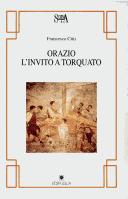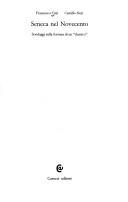| Listing 1 - 10 of 14 | << page >> |
Sort by
|

ISBN: 8872281253 Year: 1994 Volume: 6 Publisher: Bari Edipuglia
Abstract | Keywords | Export | Availability | Bookmark
 Loading...
Loading...Choose an application
- Reference Manager
- EndNote
- RefWorks (Direct export to RefWorks)
Epistolary poetry, Latin --- Poésie épistolaire latine --- History and criticism. --- Histoire et critique --- Horace. --- Rome --- Rome dans la littérature --- In literature. --- -Latin epistolary poetry --- Latin poetry --- History and criticism --- Horace --- Gorat︠s︡īĭ --- Gorat︠s︡iĭ Flakk, Kvint --- Horacij --- Horacio, --- Horacio Flaco, Q. --- Horacjusz --- Horacjusz Flakkus, Kwintus --- Horacy --- Horatius Flaccus, Quintus --- Horaṭiyos --- Horaṭiyus --- Horats --- Horaz --- Khorat︠s︡iĭ --- Khorat︠s︡iĭ Flak, Kvint --- Orazio --- Orazio Flacco, Quinto --- הוראציוס --- הורטיוס --- Horacij Flakk, Kvint --- -History and criticism --- Poésie épistolaire latine --- Rome dans la littérature
Book
ISBN: 8855525425 Year: 2000 Volume: 65 Publisher: Bologna Pàtron
Abstract | Keywords | Export | Availability | Bookmark
 Loading...
Loading...Choose an application
- Reference Manager
- EndNote
- RefWorks (Direct export to RefWorks)
Latin poetry --- Intertextuality --- Poésie latine --- Intertextualité --- Themes, motives --- Thèmes, motifs --- Horace --- Rome --- Rome dans la littérature --- In literature --- Poésie latine --- Intertextualité --- Thèmes, motifs --- Rome dans la littérature --- Epistolary poetry, Latin --- Laudatory poetry, Latin --- Verse satire, Latin --- Criticism --- Semiotics --- Influence (Literary, artistic, etc.) --- History and criticism --- Orazio --- Horacij Flakk, Kvint --- Criticism and interpretation. --- In literature. --- Horatius Flaccus, Quintus --- Horatius Flaccus, Q. --- Gorat︠s︡īĭ --- Gorat︠s︡iĭ Flakk, Kvint --- Horacij --- Horacio, --- Horacio Flaco, Q. --- Horacjusz --- Horacjusz Flakkus, Kwintus --- Horacy --- Horaṭiyos --- Horaṭiyus --- Horats --- Horaz --- Khorat︠s︡iĭ --- Khorat︠s︡iĭ Flak, Kvint --- Orazio Flacco, Quinto --- הוראציוס --- הורטיוס

ISBN: 8843019791 9788843019793 Year: 2001 Volume: 1. 97 Publisher: Roma Carocci
Abstract | Keywords | Export | Availability | Bookmark
 Loading...
Loading...Choose an application
- Reference Manager
- EndNote
- RefWorks (Direct export to RefWorks)
Mythology, Classical, in literature. --- Ethics, Ancient. --- Tragedy. --- Mythologie ancienne dans la littérature --- Morale ancienne --- Tragédie --- Seneca, Lucius Annaeus, --- Computer network resources. --- Stage history --- In literature. --- Tragedies. --- Mythology, classical, in literature --- Ethics, Ancient --- Tragedy --- Criticism and interpretation --- History --- Computer network resources --- In literature --- Tragedies --- Mythologie ancienne dans la littérature --- Tragédie --- Mythology, Classical, in literature --- Drama --- Ancient ethics --- Seneca, Lucius Annaeus --- Sénèque --- Seneca --- Annaeus Seneca, Lucius, --- Seneca, Annaeus, --- Seneca, --- Seneca, L. A. --- Seneca, Lucio Anneo, --- Seneka, --- Seneka, L. Annėĭ, --- Sénèque, --- סנקא, לוציוס אנאוס --- Pseudo-Seneca --- Seneca, Lucius Annaeus, - approximately 4 BC-65 AD - Criticism and interpretation - History - 20th century --- Seneca, Lucius Annaeus, - approximately 4 BC-65 AD - Computer network resources --- Seneca, Lucius Annaeus, - approximately 4 BC-65 AD - Stage history - 20th century --- Seneca, Lucius Annaeus, - approximately 4 BC-65 AD - In literature --- Seneca, Lucius Annaeus, - approximately 4 BC-65 AD - Tragedies --- Seneca, Lucius Annaeus, - approximately 4 BC-65 AD
Book
ISBN: 9788822258120 8822258126 Year: 2008 Publisher: Firenze Olschki
Abstract | Keywords | Export | Availability | Bookmark
 Loading...
Loading...Choose an application
- Reference Manager
- EndNote
- RefWorks (Direct export to RefWorks)
Philosophy, Ancient, in literature --- Philosophie ancienne dans la littérature --- Lucretius Carus, Titus. --- 091 LUCRETIUS CARUS, TITUS --- Handschriftenkunde. Handschriftencatalogi--LUCRETIUS CARUS, TITUS --- Lucretius Carus, Titus --- Philosophy --- 091 LUCRETIUS CARUS, TITUS Handschriftenkunde. Handschriftencatalogi--LUCRETIUS CARUS, TITUS --- Philosophie ancienne dans la littérature
Book
ISBN: 3487148722 9783487148724 Year: 2012 Publisher: Hildesheim : Georg Olms,
Abstract | Keywords | Export | Availability | Bookmark
 Loading...
Loading...Choose an application
- Reference Manager
- EndNote
- RefWorks (Direct export to RefWorks)
Mythology in motion pictures --- Oedipe (Mythologie grecque) dans la littérature --- Oedipe (Mythologie grecque) --- Mythologie au cinéma --- Art --- Oedipus --- Oedipus --- In literature. --- Art.
Book
ISBN: 9788822261892 8822261895 Year: 2012 Volume: 68 Publisher: Firenze : L.S. Olschki,
Abstract | Keywords | Export | Availability | Bookmark
 Loading...
Loading...Choose an application
- Reference Manager
- EndNote
- RefWorks (Direct export to RefWorks)
Book
ISBN: 9783110401783 3110401789 3110402084 3110401886 9783110401882 9783110402087 Year: 2015 Publisher: Berlin de Gruyter
Abstract | Keywords | Export | Availability | Bookmark
 Loading...
Loading...Choose an application
- Reference Manager
- EndNote
- RefWorks (Direct export to RefWorks)
Ancient declamation-the practice of delivering speeches on the basis of fictitious scenarios-defies easy categorization. It stands at the crossroads of several modern disciplines. It is only within the past few decades that the full complexity of declamation, and the promise inherent in its study, have come to be recognized. This volume, which contains thirteen essays from an international team of scholars, engages with the multidisciplinary nature of declamation, focusing in particular on the various interactions in declamation between rhetoric, literature, law, and ethics. Contributions pursue a range of topics, but also complement each other. Separate essays by Brescia, Lentano, and Lupi explore social roles-their tensions and expectations-as defined through declamation. With similar emphasis on historical circumstances, Quiroga Puertas and Tomassi consider the adaptation of rhetorical material to frame contemporary realities. Schwartz draws attention to the sometimes hazy borderline between declamation and the courtroom. The relationship between laws and declamation, a topic of abiding importance, is examined in studies by Berti, Breij, and Johansson. Also with an eye to the complex interaction between laws and declamation, Pasetti offers a narratological analysis of cases of poisoning. Citti discovers the concept of natural law represented in declamatory material. While looking at a case of extreme cruelty, Huelsenbeck evaluates the nature of declamatory language, emphasizing its use as an integral instrument of performance events. Zinsmaier looks at discourse on the topic of torture in rhetorical and legal contexts.
Rhetoric, Ancient. --- Law in literature. --- Ethics in literature. --- Latin literature --- Greek literature --- History and criticism. --- Greek literature. --- Latin literature. --- Ancient rhetoric --- Classical languages --- Greek language --- Greek rhetoric --- Latin language --- Latin rhetoric --- Rhetoric --- Greek Declamation, Roman Declamation, Ancient Rhetoric, Ancient Law.
Book
ISBN: 9788822263926 8822263928 Year: 2014 Publisher: Firenze Olschki
Abstract | Keywords | Export | Availability | Bookmark
 Loading...
Loading...Choose an application
- Reference Manager
- EndNote
- RefWorks (Direct export to RefWorks)
Book
ISBN: 9783487153735 3487153734 Year: 2017 Publisher: Hildesheim Olms
Abstract | Keywords | Export | Availability | Bookmark
 Loading...
Loading...Choose an application
- Reference Manager
- EndNote
- RefWorks (Direct export to RefWorks)
Trojan War --- Literature and the war. --- Euripides. --- Seneca, Lucius Annaeus,
Book
ISBN: 9788869696329 9788869696336 8869696332 Year: 2022 Publisher: Venezia Edizioni Ca' Foscari
Abstract | Keywords | Export | Availability | Bookmark
 Loading...
Loading...Choose an application
- Reference Manager
- EndNote
- RefWorks (Direct export to RefWorks)
Il nome di Agamennone evoca un tempo antico e primitivo, quando il potere coincide con la forza, e una storia familiare che narra di una catena ininterrotta di delitti di sangue. Agamennone è il protagonista di una biografia dolorosa, costretto a fare i conti con la maledizione che colpisce la sua famiglia e lo costringe a errori e colpe, imbrigliato dalla rivalità con il più valoroso e nobile degli eroi, Achille, da cui esce sconfitto prima ancora della sfida, vincitore di Troia, ma vittima di un destino tragico. Questo volume nasce nel solco di una tradizione di studi del Dipartimento di Beni Culturali e del Centro di Studi ‘La permanenza del Classico’ dell’Università di Bologna iniziata con Edipo (Edipo classico e contemporaneo, 2012) e proseguita con le Troiane (Troiane classiche e contemporanee, 2017) e raccoglie saggi sulle versioni antiche del mito, le tragedie di Eschilo e Seneca, sulle riscritture moderne e contemporanee, nella letteratura, nel teatro, nella musica, nell’arte.
| Listing 1 - 10 of 14 | << page >> |
Sort by
|

 Search
Search Feedback
Feedback About UniCat
About UniCat  Help
Help News
News